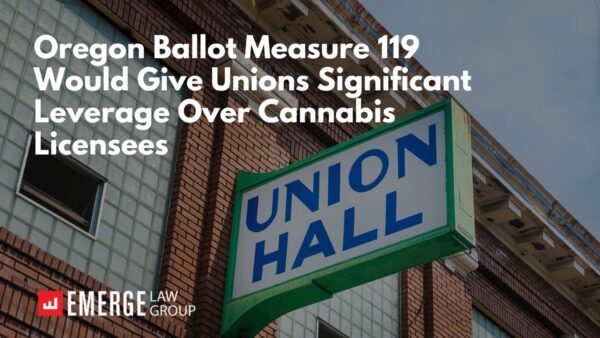CannaBeat is a curated biweekly selection of top news stories impacting business, research, and culture in the cannabis industry, crafted by Emerge Law Group.
Emerge’s Hot Take
New Markets Within California Staggeringly Slow To Open
California continues to be one of the toughest cannabis markets in the country. Although California grows top quality cannabis and manufactured cannabis products, many operators are struggling to navigate and adhere to the layers of regulatory requirements, paying high taxes, and keeping afloat long enough to even open the doors and commence operations. At the same time, the illegal market continues to remain competitive even with the enforcement by the Department of Cannabis Control (“DCC”) (For more about DCC’s increased enforcementand double collections, read this story by North Bay Business Journal HERE).
While cannabis is legal at the state level in California, local jurisdictions have prohibited the growth of the industry by either banning operations altogether or overregulating it in such a way that the time and cost to permit and license the business becomes prohibitively expensive for many. As of today, still 56% of California cities and counties do not allow any type of cannabis operations, and 61% do not allow any retail businesses according to DCC’s Database HERE. These prohibitions, along with heavy regulatory requirements, remain critical issues.
California lawmakers have attempted to remove the local authority to ban cannabis operations on multiple occasions to no avail. As a result of local government rejection, 40% of retail cannabis operations are condensed into only seven jurisdictions – Long Beach, Los Angeles, Palm Springs, Sacramento, San Francisco, Santa Ana, and Santa Rosa. Even in jurisdictions that have allowed and issued cannabis permits, few retail stores have opened because of the lengthy and expensive bureaucratic process at both the state and local levels. Many have been working to open for years only to run out of money before they pass the finish line.
Given the size of the state and locations of the retail stores, the concentrations of available legal cannabis leaves much of the population without access to legal medicine or recreational products.
Other Noteworthy News
California Cannabis Companies Tied To Fake Union Could Lose Their Licenses
“At least a dozen California cannabis businesses that signed required agreements with a labor union now deemed illegitimate – including collapsed distribution giant Herbl – are at risk of losing their licenses, state regulators said Monday. California law requires marijuana businesses to sign a labor peace agreement with a ‘bona fide’ labor organization before they are issued a state license. But in an apparent effort to flout worker-friendly marijuana legalization laws and benefit businesses seeking labor cost savings, cannabis businesses across the country are signing these agreements with ‘labor organizations’ that have few or no members and no intent to organize workers, critics charge.”
“On July 6, California’s Agricultural Labor Relations Board (ALRB) ruled that an organization calling itself the Professional Technical Union Local 33, or ProTech, is ‘not a bona fide labor organization.’ A bona fide labor organization is one that demonstrates ‘a sincere and good faith intent to organize and represent employees as a collective bargaining representative, including the capacity or ability to do so,’ the ALRB wrote in its ruling. That’s ‘as opposed to’ an ‘employer-sponsored’ group, the ruling added. In the case of ProTech, the ‘union’ failed ‘to respond to basic inquiries,’ including providing information about membership and organization, which suggests ‘impropriety,’ the ALRB added.”
Schumer Says Passing Marijuana Banking Bill ‘Will Not Be Easy’ an Needs GOP Support, As He Sets Agenda for Summer
“Passing a marijuana banking bill is a priority during the upcoming summer work session in the Senate, but it ‘will not be easy’ and needs GOP support to advance, Majority Leader Chuck Schumer (D-NY) said in a letter to colleagues that notably omitted his typical call for attaching criminal justice provisions like expungements. The letter that Schumer released on Sunday says that lawmakers will first focus on advancing must-pass appropriations and defense legislation. But he said that Democrats ‘will also continue our work with our Republican colleagues to advance legislation in a range of policy areas.’ That includes ‘making progress on bipartisan bills’ like one to ‘safeguard cannabis banking’ that already received a hearing in the Senate Banking Committee in May and that advocates hope will be taken up for a vote in that panel this month. ‘Passing these bills will not be easy, and we will depend on cooperation of our Republican colleagues to get any of them done,’ Schumer said. ‘I applaud our committees and our caucus for the continued work to make positive and meaningful changes in the lives of every day Americans.’”
Rhode Island Cannabis Dispensary Sues Over Labor Requirements in Legalization Law
“One of Rhode Island’s longest-running marijuana dispensaries has filed suit over the state’s budding cannabis legalization law, challenging a requirement that retailers enter into labor agreements with workers in order to sell marijuana. Greenleaf Compassionate Care Center claims it was ‘coerced into entering an oppressive collective bargaining agreement’ because of the state law, which passed in 2022. The Rhode Island General Assembly legalized cannabis last year with an expansive law called the Rhode Island Cannabis Act. It allowed people to legally possess and grow marijuana for recreational use, expunged existing marijuana convictions, and also set up a process for retail sales. Tucked into the 125-page law is a provision that dispensaries — including those that existed before the law passed — enter into ‘labor peace agreements’ with a ‘bona fide labor organization’ in order to be licensed to sell cannabis by the state of Rhode Island. Greenleaf has been open in Portsmouth, a town on Aquidneck Island, since 2013, when only medical marijuana was allowed. Existing medical dispensaries like Greenleaf were allowed to start selling recreational cannabis in December 2022, but had to first seek a hybrid license from the state.”
Marijuana in the Military? A Push In Congress Would Loosen Cannabis Rules, Ease Recruitment Crisis
“Bipartisan lawmakers in Congress are looking to relax guidelines surrounding marijuana use for military members − in part as a solution to bolster recruitment efforts for the armed services. Conservative firebrand Matt Gaetz, R-Fla., is the latest lawmaker to propose a change to the military's standards when it comes to cannabis. The Florida representative introduced an amendment Thursday that would end cannabis testing for military members. He proposed the amendment as an addition to the National Defense Authorization Act, or NDAA, an annual reauthorization of military programs that Congress passes each year. Gaetz's amendment proposes eliminating cannabis testing at the time of a service member's enlistment or when they are receiving commission as an officer. ‘Our military is facing a recruitment and retainment crisis unlike any other time in American history,’ he tweeted. ‘I do not believe that prior use of cannabis should exclude Americans from enlisting in the armed forces. We should embrace them for stepping up to serve our country.’ According to the National Conference of State Legislatures, medical use of marijuana is legal in 38 states and the District of Columbia. In 23 states and the District of Columbia, legislatures have passed measures to regulate cannabis for non-medical use.”
Germany Unveils Draft Bill to Legalize Cannabis
“Germany's government is taking steps toward the legalization of cannabis by publishing the draft bill for the first pillar of a two-pillar model designed to dismantle prohibition policies. German's Ministry of Health published on July 5 the long-waited draft bill to regulate the use of cannabis for personal use, home growing, and the establishment of cannabis growers' associations designed similarly to the cannabis social clubs' model. The proposed legislation aims to address the first pillar of a comprehensive two-pillar model that will put an end to cannabis prohibition in the European country. Under the draft bill, adults aged 18 and above will be allowed to possess up to 25 grams of cannabis for personal use and cultivate a maximum of three plants. However, the consumption of cannabis in the ‘immediate vicinity’ of individuals under 18, within a 200-meter radius of schools, children's and youth facilities, playgrounds, publicly accessible sports facilities, and pedestrian zones between 7 am and 8 pm, will remain prohibited. It's important to note that fines and criminal charges will continue to be imposed for specific unlawful activities.”
Subscribe
Subscribe to CannaBeat to receive essential weekly articles on news, business, and culture in the cannabis industry, delivered straight to your inbox.
CannaBeat by Emerge Law Group
CannaBeat is a weekly brief on news, business, and culture in the cannabis industry curated by members of Emerge Law Group's distinguished Cannabis Industry Group.






